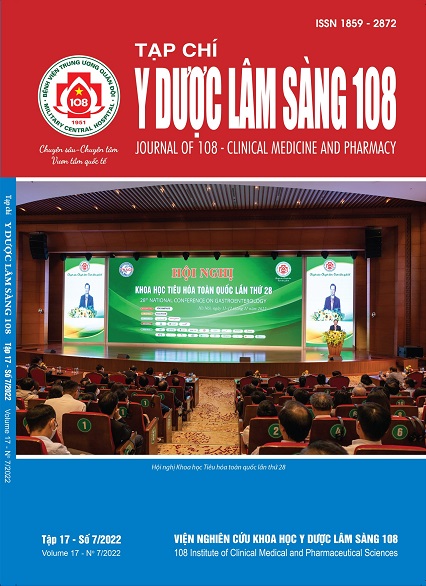Evaluation of the results of patient's early eating after hepatectomy for hepatocellular carcinoma
Main Article Content
Keywords
Abstract
Objective: To evaluate the results of patient's early eating after hepatectomy for hepatocellular carcinoma (HCC). Subject and method: From May 2021 to April 2012, 123 patients with HCC underwent hepatectomy. Sixty patients took diet postoperative flatus-pass (Stage 1: conventional diet group); 63 patients took early diet postoperative 6 hours (Stage 2: early diet group. Comparison between the two groups: Patient characteristics, flatus-pass time, nausea, vomiting, admission days, postoperative day (POD) 1, 3, 5, 7 profiles of albumin, prothrombin, total bilirubin, GOT, GPT, and postoperative complications. Result: Flatus-pass time and postoperative admission days were shorter in the early diet group compared with the conventional diet group, statistically significant (p<0.05). Total bilirubin levels were lower at POD#3 and 5 in the early diet group; GOT and GPT levels were higher at POD#1 but lower at POD#3, 5, and 7. There were no significant differences in albumin, prothrombin, and postoperative complication rates. Conclusion: Early diet group has better gastrointestinal motility recovery, liver function recovery, and shorter postoperative admission days; no difference in nutritional recovery and postoperative complication rates compared to the conventional diet group.
Article Details
References
2. Richter B, Schmandra TC, Golling M, Bechstein WO (2006) Nutritional support after open liver resection: A systematic review. Dig Surg 23: 139-145.
3. Lee J, Kwon CHD, Kim MJ, Shin M, Joh JW (2012) Effect of early enteral nutrition after hepatectomy in hepatocellular carcinoma patients. Korean J Hepatobiliary Pancreat Surg 16: 129-133.
4. Kawaguchi D, Hiroshima Y, Matsuo K, Koda K, Endo I, Taguri M, Tanaka K (2015) A randomized clinical trial of early enteral nutrition to prevent infectious complications in patients with extensive liver resection. Int Surg 100: 1414-1423.
5. Gao LB, Tian H, Wang XG, Yu XF, Guan Y, Chen ML, Zhang J (2015) Early enteral and parenteral nutritional support after hepatectomy in patients with hepatic carcinoma: A systematic review and meta-analysis. OncoTargets and Therapy 8: 623-631.
6. Lewis SJ, Andersen HK, Thomas S (2009) Early enteral nutrition within 24 h of intestinal surgery versus later commencement of feeding: A systematic review and meta-analysis. J Gastrointest Surg 13: 569-575.
7. Noba L, Rodgers S, Chandler C, Balfour A, Hariharan D, Yip V (2020) Enhanced recovery after surgery (ERAS) reduces hospital costs and improve clinical outcomes in liver surgery: A systematic review and meta-analysis. J Gastrointest Surg; 24(4): 918-932.
8. Melloul E, Hubner M, Scott M et al (2016) Guidelines for perioperative care for liver surgery: enhanced recovery after surgery (eras) society recommendations. World J Surg 40: 2425-2440.
9. Huang L, Li J, Yan JJ, Liu CF, Wu MC, Yan YQ (2012) Prealbumin is predictive for postoperative liver insufficiency in patients undergoing liver resection. World J Gastroenterol 18(47): 7021-7025.
10. Tang SP, Hu ZM (2011) Early enteral nutrition in patients after partial hepatectomy. Xian Dai Lin Chuang Hu Li Za Zhi 10: 51-53.
 ISSN: 1859 - 2872
ISSN: 1859 - 2872
